Best eCommerce Analytics Tools
Finding the best eCommerce Analytics Tools Software for your business is now faster and easier! Compare prices, reviews, features, and get a free consultation to find the perfect software.



No Cost Personal Advisor
List of 20 Best ECommerce Analytics Tools
Tools by Jungle Scout
Jungle Scout is a fully featured Ecommerce software designed to serve SMEs, Startup, Agencies, Enterprises. Jungle Scout provides end-to-end solutions designed for Web App. This Ecommerce software offers Dashboard, Customer Management, Affiliate Marketing, Compliance Management, Contact Management at one place. Learn more about Jungle Scout
Explore various Jungle Scout features, compare the pricing plans, and unlock the potential of seamless operations by selecting the right software for your business.
Features
View all Jungle Scout Features- Affiliate Marketing
- Campaign Management
- Campaign Segmentation
- Dashboard
- Continuous Deployment
- Affiliate Tracking
- Contact Management
- Analytics
Pricing
Jungle Scout Caters to
- StartUps
- SMBs
- Agencies
- Enterprises
Category Champions | 2024
Tools by Google Inc.
Google Analytics is geared toward small and medium-sized retail websites. It is a free Web analytics service that provides statistics and basic analytical tools for SEO and marketing purposes. designed specifically for the needs of enterprise marketers. Read Google Analytics Reviews
Explore various Google Analytics features, compare the pricing plans, and unlock the potential of seamless operations by selecting the right software for your business.
Features
View all Google Analytics Features- Influencer Identification
- Post Scheduling
- Report Exporting
- Customizable Reports
- Dashboard
- Paid Campaign Tracking
- Competitor Analysis
- Campaign Analytics
Google Analytics Caters to
- StartUps
- SMBs
- Agencies
- Enterprises
Contenders | 2024
Tools by Looker Data Sciences, Inc
Looker is a one of best business intelligence software for small & medium businesses. It is very powerful and easily big data analytics platform provide helps a company to get value from data. That's less frequently, the human intelligence capacity applied in the business activities data. Read Looker Reviews
Explore various Looker features, compare the pricing plans, and unlock the potential of seamless operations by selecting the right software for your business.
Features
View all Looker Features- Ad hoc Query
- Strategic Planning
- Visualization / Presentation
- Data Analysis
- Benchmarking
- Performance Management
- Data Visualization
- Key Performance Indicators
Looker Caters to
- StartUps
- SMBs
- Agencies
- Enterprises
Contenders | 2024
Tools by Hotjar
Hotjar is a lead capture software, packed with robust features required to leverage your user analysis and feedback initiatives. It helps you understand your user better by providing complete visibility and instant feedback on the user's experience on your website. Read Hotjar Reviews
Explore various Hotjar features, compare the pricing plans, and unlock the potential of seamless operations by selecting the right software for your business.
Features
View all Hotjar Features- Feedback Collection
- Heatmaps
- Usability Testing
- User Research
- Question Branching
- Feedback Management
- Data Visualization
- Custom Survey URLs
Hotjar Caters to
- StartUps
- SMBs
- Agencies
- Enterprises
Contenders | 2024
Tools by Databox, Inc
Databox is a very easy, flexible and user-friendly business intelligence software solution. That is first of KPI dashboards for business. It is based on goals or connection with any of them straightforwardly to get help one-on-one. Read Databox Reviews
Explore various Databox features, compare the pricing plans, and unlock the potential of seamless operations by selecting the right software for your business.
Features
View all Databox Features- Key Performance Indicators
- Performance Metrics
- Ad hoc Analysis
- Budgeting & Forecasting
- Strategic Planning
- Trend / Problem Indicators
- Report writers
- Ad hoc Query
Pricing
Free
$ 0
Per Month
Basic
$ 59
Per Month
Business
$ 299
Per Month
Databox Caters to
- StartUps
- SMBs
- Agencies
- Enterprises
Contenders | 2024
Tools by Yotpo
One of the most powerful of Yotpo Loyalty Software is generated customer content management like drive traffic, reviews, marketing and increase sales managing in the loyalty solutions. It has increase reviews leading to higher on-site marketing without effective and SEO ranking. Read Yotpo Reviews
Explore various Yotpo features, compare the pricing plans, and unlock the potential of seamless operations by selecting the right software for your business.
Features
View all Yotpo Features- Member Portal
- Event Calendar
- CRM
- Rewards Management
- Loyalty Management
- Customer Activity Tracking
- Membership Management
- Automation Rules
Yotpo Caters to
- StartUps
- SMBs
- Agencies
- Enterprises
Contenders | 2024
Powerful product analytics to find, engage, and re
Mixpanel gives everyone the ability to answer complex product questions with ease. Our robust, self-serve product analytics solution helps teams query real-time data and build visualizations quickly to understand product usage trends. Read Mixpanel Reviews
Explore various Mixpanel features, compare the pricing plans, and unlock the potential of seamless operations by selecting the right software for your business.
Features
View all Mixpanel Features- Website Analytics
- Cohort Analysis
- Push Notifications
- Data Quality Control
- Funnel Analysis
- In-App Events Tracking
- A/B Testing
- Retention Tracking
Pricing
FREE
$ 0
Per Month
GROWTH
$ 17
Per Month
ENTERPRISE
$ 0
Custom plans and pricing to suit your needs
Mixpanel Caters to
- StartUps
- SMBs
- Agencies
- Enterprises
Contenders | 2024
Reliable data and competitive intelligence for ret
Retailers can increase profitability with a data-backed approach. Using RetailScape by Bungee Tech - retailers are able to monitor price, promotion, assortment, and availability data across geographies. Reliable, scalable data for better decisions. Read RetailScape Reviews
Explore various RetailScape features, compare the pricing plans, and unlock the potential of seamless operations by selecting the right software for your business.
Features
View all RetailScape Features- Competitor Analysis
- Filtered Views
- Machine Learning
- Data Analysis
- Data Management
- Data Matching
- Data Visualization
Pricing
RetailScape
$ 1
Subscription License & Usage-based
RetailScape Caters to
- StartUps
- SMBs
- Agencies
- Enterprises
Emergents | 2024
Tools by Webgility
Webgility is a helps build an online store. It provides an optimal shopping experience for your customers. It does not require much training and has got amazing features to help you boost your sales. Learn more about Webgility
Explore various Webgility features, compare the pricing plans, and unlock the potential of seamless operations by selecting the right software for your business.
Features
View all Webgility Features- Channel Management
- Email Marketing / SMS Marketing
- Custom Domain
- Catalog Management
- Integration with marketplaces
- Orders Management
- Order Management
Pricing
Advanced
$ 329
Per Month
Premium
$ 499
Per Month
Webgility Caters to
- StartUps
- SMBs
- Agencies
- Enterprises
Emergents | 2024
Tools by Glassbox Digital
Glassbox is a fully featured Big Data Software designed to serve Enterprises, SMEs. Glassbox provides end-to-end solutions designed for Web App. This online Big Data system offers Data Mining, Data Visualization, High Volume Processing, Predictive Analytics at one place. Learn more about Glassbox
Explore various Glassbox features, compare the pricing plans, and unlock the potential of seamless operations by selecting the right software for your business.
Features
View all Glassbox Features- High Volume Processing
- Data Visualization
- Data Mining
- Predictive Analytics
Glassbox Caters to
- StartUps
- SMBs
- Agencies
- Enterprises
Emergents | 2024
Tools by Conjura
Conjura provides various metrics such as ROI, CPA, LTV, algorithmic attribution, lead scoring, predictive LTV, predictive churn and customer segmentation; It also classifies these metrics in terms of the channels, campaigns and devices through which they were achieved. Learn more about Conjura
Explore various Conjura features, compare the pricing plans, and unlock the potential of seamless operations by selecting the right software for your business.
Features
View all Conjura Features- Website Analytics
- Predictive Analytics
- Channel Attribution
- Dashboard
- Customer Journey Mapping
- ROI Tracking
- Performance Metrics
- A/B Testing
Conjura Caters to
- StartUps
- SMBs
- Agencies
- Enterprises
Emergents | 2024
Tools by Metrilo
Metrilo is a fully featured Ecommerce Software designed to serve Agencies, Enterprises. Metrilo provides end-to-end solutions designed for Web App. This online Ecommerce system offers at one place. Learn more about Metrilo
Explore various Metrilo features, compare the pricing plans, and unlock the potential of seamless operations by selecting the right software for your business.
Pricing
Small
$ 119
month
Medium
$ 299
month
Large
$ 499
month
Metrilo Caters to
- StartUps
- SMBs
- Agencies
- Enterprises
Emergents | 2024
Tools by Woopra Inc
Looking for a useful tool to monitor customer journey analytics? Woopra will prove to be one of the best tools. It analyses customer journey, ongoing trends, customer retention techniques, customer segregation, and so on. Learn more about Woopra
Explore various Woopra features, compare the pricing plans, and unlock the potential of seamless operations by selecting the right software for your business.
Features
View all Woopra Features- Dashboard
- Trend Analysis
- Multi-Channel Collection
- Action Management
- Customer Segmentation
- Text Analysis
Pricing
Core
$ 0
Per Month
Pro
$ 999
Per Month
Woopra Caters to
- StartUps
- SMBs
- Agencies
- Enterprises
Emergents | 2024
Tools by Glew
Glew is a fully featured Business Intelligence Software designed to serve Agencies, Startups. Glew provides end-to-end solutions designed for Web App. This online Business Intelligence system offers at one place. Learn more about Glew
Explore various Glew features, compare the pricing plans, and unlock the potential of seamless operations by selecting the right software for your business.
Glew Caters to
- StartUps
- SMBs
- Agencies
- Enterprises
Emergents | 2024
Tools by Optimizely Inc
Optimizely makes it easy to test and personalize your website and mobile app. It is best Conversion Optimization Software with powerful solutions for delivering the best digital experiences to every customer. Learn more about Optimizely
Explore various Optimizely features, compare the pricing plans, and unlock the potential of seamless operations by selecting the right software for your business.
Optimizely Caters to
- StartUps
- SMBs
- Agencies
- Enterprises
Emergents | 2024
Tools by Supermetrics
Supermetrics is a fully featured Reporting Software designed to serve Agencies, Startups. Supermetrics provides end-to-end solutions designed for Web App. This online Reporting system offers Drill Down, Marketing Reports, Report Export, Scheduled / Automated Reports, Customizable Dashboard at one place. Learn more about Supermetrics
Explore various Supermetrics features, compare the pricing plans, and unlock the potential of seamless operations by selecting the right software for your business.
Features
View all Supermetrics Features- Forecasting
- Report Export
- Customizable Dashboard
- Sales Reports
- Marketing Reports
- Scheduled / Automated Reports
- Drill Down
- Data Source Connectors
Pricing
Supermetrics for Google Sheets
$ 49
Per Month
Supermetrics for Data Studio
$ 19
Per Month
Supermetrics Data Grabber
$ 19
Per Month
Supermetrics Caters to
- StartUps
- SMBs
- Agencies
- Enterprises
Emergents | 2024
Tools by Matomo
Matomo Analytics is a fully featured Web Analytics Software designed to serve Startups, SMEs. Matomo Analytics provides end-to-end solutions designed for Windows. This online Web Analytics system offers Conversion Tracking, Multiple Site Management, Campaign Management, Referral Source Tracking, Goal Tracking at one place. Learn more about Matomo Analytics
Explore various Matomo Analytics features, compare the pricing plans, and unlock the potential of seamless operations by selecting the right software for your business.
Features
View all Matomo Analytics Features- Referral Source Tracking
- Campaign Management
- Goal Tracking
- Keyword Tracking
- Site Search Tracking
- Conversion Tracking
- User Interaction Tracking
- Time on Site Tracking
Pricing
Essential
$ 19
Per Month
Business
$ 29
Per Month
Matomo Analytics Caters to
- StartUps
- SMBs
- Agencies
- Enterprises
Emergents | 2024
No-code digital analytics platform to simplify dat
OWOX BI is a fully featured Business Intelligence Software designed to serve Agencies, Startups. OWOX BI provides end-to-end solutions designed for Windows. This online Business Intelligence system offers Data Analysis, Ad hoc Analysis, Data Visualization, Trend / Problem Indicators, Key Performance Indicators at one place. Learn more about OWOX BI
Explore various OWOX BI features, compare the pricing plans, and unlock the potential of seamless operations by selecting the right software for your business.
Features
View all OWOX BI Features- Ad Hoc Reports
- Dashboard
- Key Performance Indicators
- Big Data Analytics
- Profitability Analysis
- Performance Metrics
- Data Analysis
- Data Visualization
Pricing
Starter
$ 99
Per Month
Growth
$ 450
Per Month
Professional
$ 950
Per Month
OWOX BI Caters to
- StartUps
- SMBs
- Agencies
- Enterprises
Emergents | 2024
Tools by Heap
Heap is a fully featured Reporting Software designed to serve Startups, Enterprises. Heap provides end-to-end solutions designed for Windows. This online Reporting system offers Sales Reports, Performance Metrics, Campaign Management, User Interaction Tracking, Customizable Dashboard at one place. Learn more about Heap
Explore various Heap features, compare the pricing plans, and unlock the potential of seamless operations by selecting the right software for your business.
Features
View all Heap Features- Ad Hoc Reports
- Trend / Problem Indicators
- Keyword Tracking
- Filtered Views
- Customizable Dashboard
- Referral Source Tracking
- Campaign Management
- Visual Discovery
Heap Caters to
- StartUps
- SMBs
- Agencies
- Enterprises
Emergents | 2024
Tools by Contlo
Contlo is an AI-powered Customer Data & Marketing platform that helps Ecommerce Stores and Direct-to-Consumer (D2C) brands generate more revenue, increase retention, and automate personalized experiences through omnichannel (Email, SMS, Push notifications, etc.) customer engagement. Control's prescriptive AI engine assists brands in generating a 360-degree view of a customer and leveraging that to create customer communication recommendations. Learn more about Contlo
Explore various Contlo features, compare the pricing plans, and unlock the potential of seamless operations by selecting the right software for your business.
Features
View all Contlo Features- Custom Product Attributes
- Customer Management
- Mobile Access
- Behavioral Targeting
- Campaign Management
- Campaign Segmentation
- Layout & Design
- Product Recommendations
Contlo Caters to
- StartUps
- SMBs
- Agencies
- Enterprises
Emergents | 2024
Track, Optimize, and Grow your Online Sales
42Signals is an ecommerce analytics tool that enables brands to get insights on product trends, pricing, customer reviews, competitors, and more. Leverage the insights to track competition, optimize digital shelf, and analyze customer sentiment. Learn more about 42Signals
Explore various 42Signals features, compare the pricing plans, and unlock the potential of seamless operations by selecting the right software for your business.
Features
View all 42Signals Features- Analytics / ROI Tracking
- Inventory Management
- Store Customization
- Product Database
- Communication Management
42Signals Caters to
- StartUps
- SMBs
- Agencies
- Enterprises
Emergents | 2024
The most customizable profit analytics platform fo
FW Profit Analytics is a customizable solution to help you stay on top of your Amazon profitability and build expense categories to customize your analytics. You can process data and improve your analytics. Learn more about FW Analytics
Explore various FW Analytics features, compare the pricing plans, and unlock the potential of seamless operations by selecting the right software for your business.
Pricing
Starter
$ 16
Single User
FW Analytics Caters to
- StartUps
- SMBs
- Agencies
- Enterprises
Emergents | 2024
Track the impact of your marketing campaigns and g
Measurements is a data-driven marketing analytics and attribution platform that provides a holistic view of marketing impact, minimizing ad wastage with actionable insights and real-time campaign optimization. Learn more about Measurements by Factori
Explore various Measurements by Factori features, compare the pricing plans, and unlock the potential of seamless operations by selecting the right software for your business.
- Performance Metrics
- ROI Tracking
- Attribution Modeling
- Cross-Channel Attribution
- Channel Attribution
- Multi-channel Analytics
- Conversion rate optimization
- Campaign Performance Tracking
Measurements by Factori Caters to
- StartUps
- SMBs
- Agencies
- Enterprises
Emergents | 2024
Monitoring digital shelf
DigiSense360 is a cutting-edge digital shelf analytics platform that delivers business-curated insights that span pricing intelligence, competitor monitoring, content audit and compliance, assortment gaps, product search, listings, and reputation management. Learn more about DigiSense360
Explore various DigiSense360 features, compare the pricing plans, and unlock the potential of seamless operations by selecting the right software for your business.
Features
View all DigiSense360 Features- Pricing Optimization
- eCommerce Tools
- Predictive Analytics
- Price Monitoring
- Data Visualization
- Competing Product Analysis
- Recommendation Engine
- Data Extraction
DigiSense360 Caters to
- StartUps
- SMBs
- Agencies
- Enterprises
Emergents | 2024
Get More Customers Completing Your Forms
Zuko is an online form + checkout analytics and optimization tool that helps you understand when, where and why visitors abandon your forms. Helps you identify and fix form problems that are causing users to drop-out, maximizing your completion rates. Learn more about Zuko Analytics
Explore various Zuko Analytics features, compare the pricing plans, and unlock the potential of seamless operations by selecting the right software for your business.
Features
View all Zuko Analytics Features- Conversion goal tracking
- Data Integration
- Customer Segmentation
- Conversion Tracking
- User Interaction Tracking
- Funnel Analysis
- Dashboard
- Lead generation optimization
Pricing
Basic
$ 56
Per Month
Tier 1
$ 112
Per Month
Tier 2
$ 280
Per Month
Zuko Analytics Caters to
- StartUps
- SMBs
- Agencies
- Enterprises
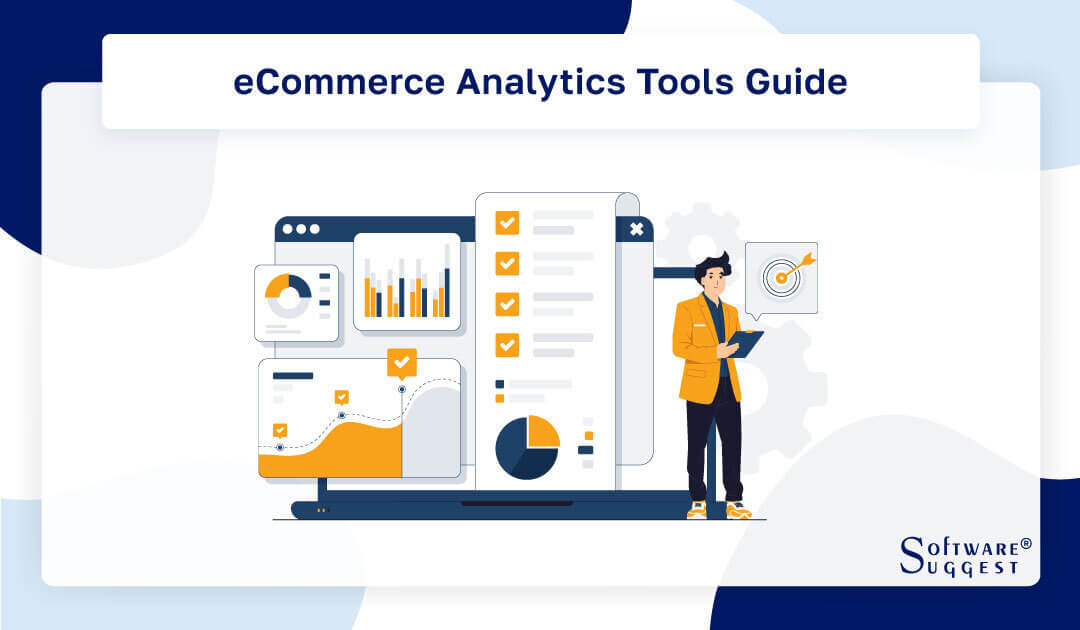
In the ever-evolving e-commerce industry, understanding customer behavior and trends is paramount for success. This understanding is made possible by eCommerce analytics tools, an advanced platform in the vast digital landscape that is now highly popular. Let's delve deeper into understanding these tools and how they are transforming e-commerce businesses.
What are eCommerce Analytics Tools?
eCommerce analytics tools are advanced platforms that offer comprehensive insights into various aspects of an e-commerce store. From tracking visitor behavior on a website to analyzing sales and conversion data, these tools are essential for making informed business decisions.
Who Uses eCommerce Analytics Software?
Understanding who utilizes eCommerce analytics software provides a clearer perspective on its diverse applications and importance. These tools are not just limited to a specific group; rather, they serve various professionals in the e-commerce ecosystem, each utilizing the data insights to improve and optimize their specific areas of operation. Some key users include:
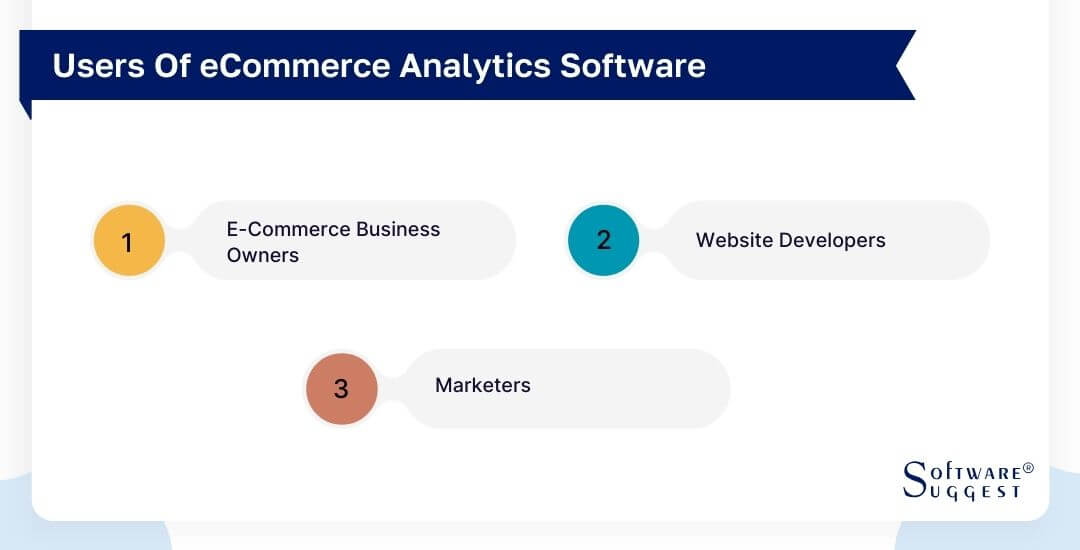
-
E-commerce Business Owners
eCommerce business owners heavily rely on eCommerce analytics software to measure their website’s performance, track sales and customer behavior, and identify areas that require improvement. This data-driven approach allows them to tailor their strategies to meet customer needs and market demands, leading to increased profits and customer satisfaction.
-
Website Developers
Website developers employ the best eCommerce analytics tools to ensure the e-commerce platforms they create are user-friendly, functional, and optimized for conversions. The insights from these tools allow developers to make real-time adjustments, ensuring seamless navigation and enhanced user engagement. These refinements translate to improved customer satisfaction and higher conversion rates.
-
Marketers
Marketers use eCommerce analytics software to gain a thorough understanding of customer preferences and behavior. This knowledge enables the creation of more precise and targeted marketing campaigns, improving both customer acquisition and retention. By analyzing the data provided, marketers can continually refine their strategies, ensuring their marketing efforts remain effective and yield a high return on investment.
What are the Benefits of Best eCommerce Analytics Tools?
Before delving into the specific benefits, it’s crucial to acknowledge the overarching impact of eCommerce analytics tools on a business’s growth and success. These powerful tools bring forth an array of advantages that transcend various facets of an e-commerce business, from marketing to customer service, enhancing overall performance and profitability. Some key benefits include:
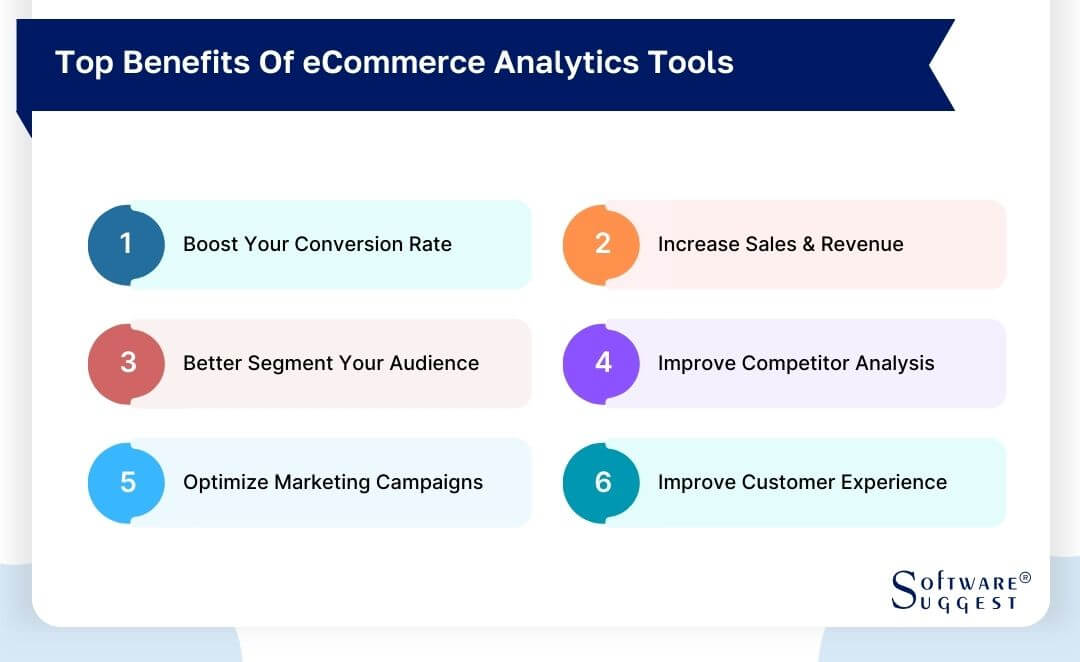
-
Boost Conversion Rate
Utilizing the top eCommerce analytics tools, businesses can significantly enhance their conversion rates. Understanding customer behavior and preferences allows for the modification of website design and functionality to better meet customer needs, ensuring a more satisfying and efficient shopping experience. This customer-centric approach leads to increased conversions and loyalty.
-
Increase Sales and Revenue
By leveraging eCommerce analytics tools, businesses can unlock critical data about user behavior, helping to identify and target key customer segments. This strategic targeting leads to increased sales and revenue, ensuring the sustained growth and prosperity of the business. Enhanced insights into customer behavior also enable the optimization of marketing strategies, further bolstering sales and revenue.
-
Better Segment Your Audience
Effective audience segmentation is achieved through eCommerce analytics tools, ensuring that marketing efforts are directed towards the most relevant and likely-to-convert customer segments. This strategic approach enhances the efficiency and return on investment of marketing campaigns. Detailed audience insights also allow for the personalization of marketing messages, further improving customer engagement and conversions.
-
Improve Competitor Analysis
eCommerce analytics tools facilitate thorough competitor analysis, providing insights into competitors' strategies and market positioning. Understanding the competitive landscape allows businesses to make informed decisions to enhance their own market standing. By analyzing competitors’ strengths and weaknesses, businesses can identify opportunities for differentiation and growth.
-
Optimize Marketing Campaigns
Utilizing the best eCommerce analytics tools enables businesses to refine and optimize their marketing strategies effectively. Insight into customer behavior and preferences allows for the creation of more targeted and effective marketing campaigns. This strategic use of eCommerce analytics tools ensures that marketing efforts are as impactful and efficient as possible.
-
Improve Customer Experience
The use of top eCommerce analytics tools helps businesses enhance the overall customer experience. By analyzing customer behavior, feedback, and preferences, businesses can make the necessary adjustments to their website design, product offerings, and customer service, ensuring a seamless and enjoyable shopping experience for all.
What are the Features of eCommerce Analytics Tools?
Behind every successful e-commerce platform is a robust analytics tool with an array of features designed to capture, analyze, and present data in an understandable manner. From monitoring customer behavior to analyzing sales and marketing campaign efficacy, these features empower businesses to gain a holistic understanding of their operations and market presence. Some key features include:
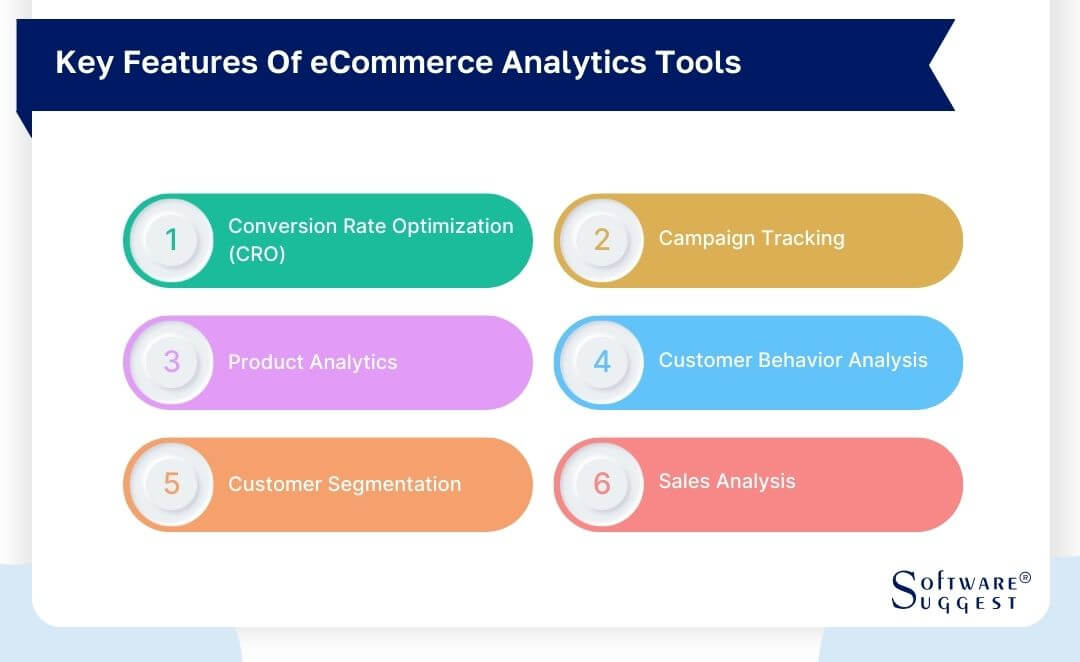
-
Conversion Rate Optimization (CRO)
eCommerce analytics platforms offer robust features for Conversion Rate Optimization (CRO), ensuring websites are optimized to effectively convert visitors into customers. These tools provide actionable insights for enhancing website design, functionality, and content, leading to an improved user experience and increased conversions. By continually monitoring and analyzing conversion data, businesses can make ongoing improvements to maximize conversion rates.
-
Campaign Tracking
Campaign tracking features offered by eCommerce analytics software enable the tracking and analysis of campaign performance. By understanding which campaigns are most effective, businesses can allocate resources more efficiently, ensuring maximum impact and return on investment. Continuous monitoring also allows for timely adjustments to campaign strategies, further enhancing effectiveness.
-
Product Analytics
eCommerce analytics platforms provide extensive product analytics, offering insights into product performance and customer preferences. These insights enable businesses to optimize their product offerings, ensuring they meet customer needs and expectations. Understanding which products are performing well allows businesses to make informed inventory and marketing decisions, enhancing profitability and customer satisfaction.
-
Customer Behavior Analysis
eCommerce analytics software provides comprehensive insights into customer behavior, enabling businesses to better understand and meet their customers’ needs. Detailed customer behavior analysis allows for the optimization of website design and functionality, ensuring a more user-friendly and engaging shopping experience.
-
Customer Segmentation
The best eCommerce marketing analytics tool and software facilitates effective customer segmentation, ensuring that marketing efforts are directed toward the most relevant customer groups. This targeted approach enhances the efficiency and return on investment of marketing campaigns, contributing to increased conversions and customer satisfaction.
-
Sales Analysis
Employing eCommerce analytics tools for thorough sales analysis allows businesses to understand which products and strategies are most effective. Insights gained assist in making informed decisions to enhance sales strategies, inventory management, and overall profitability.
How to Choose the Right eCommerce Analytics Software?
Choosing the best eCommerce analytics software requires careful consideration and navigation. It's important to choose software that fits the specific demands and objectives of your company, not just the most popular or expensive platform. Here are some aspects to keep in mind while choosing the right eCommerce analytics tool:
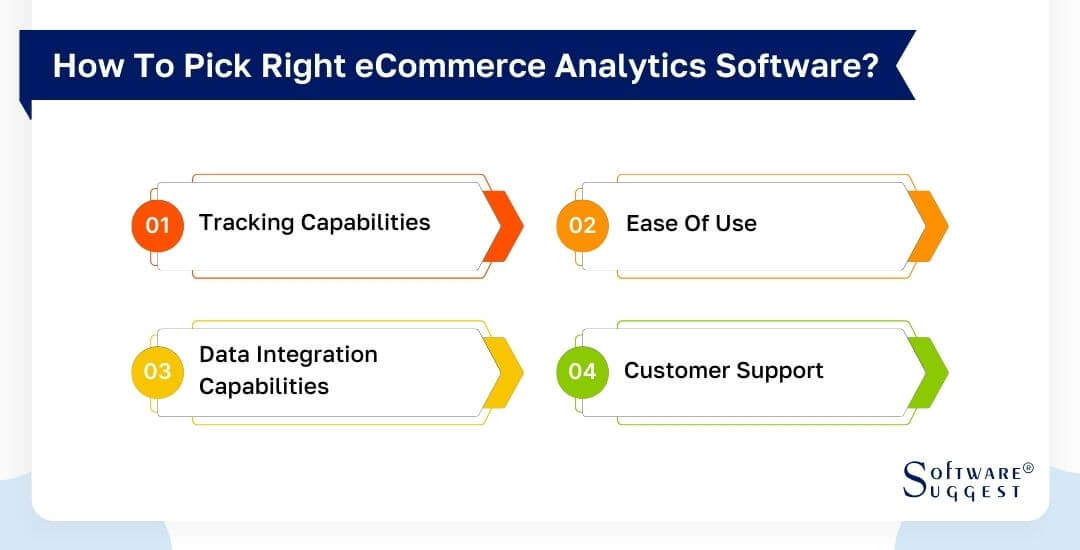
-
Tracking Capabilities
Strong tracking capabilities are crucial when selecting eCommerce analytics software. These capabilities enable thorough tracking and analysis of numerous e-commerce company factors, resulting in well-informed decisions and improved strategies. Businesses may continuously improve by having a thorough grasp of their performance thanks to the ability to measure a variety of important data.
-
Ease of Use
Select software for eCommerce data analytics that is simple to use and browse. Teams may use the software's features and capabilities to improve the productivity and profitability of e-commerce businesses thanks to a user-friendly interface. Faster onboarding and training because ease of use also means that everyone on the team can use the product to its fullest capacity.
-
Data Integration Capabilities
The software's data integration capabilities should be taken into account while selecting the best eCommerce analytics tool. Make sure the platform can easily interface with other business-related devices and software, facilitating faster data analysis and decision-making.
-
Customer Support
Choosing an eCommerce analytics tool that provides effective customer assistance is crucial. Make sure the platform you choose offers dependable and reachable customer assistance to handle any problems or inquiries, ensuring the easy and effective use of the analytics tools.
What are the Challenges Faced in eCommerce Analytics Software?
Despite their numerous benefits and essential functionalities, navigating the world of eCommerce analytics tools is not devoid of challenges. Addressing these challenges requires a thorough understanding of both the software and the intricate landscape of e-commerce operations. Moreover, hiring a skilled e-commerce developer can further minimize these challenges, optimizing the platform's performance to its fullest potential. Some key challenges related to eCommerce analytics tools include:
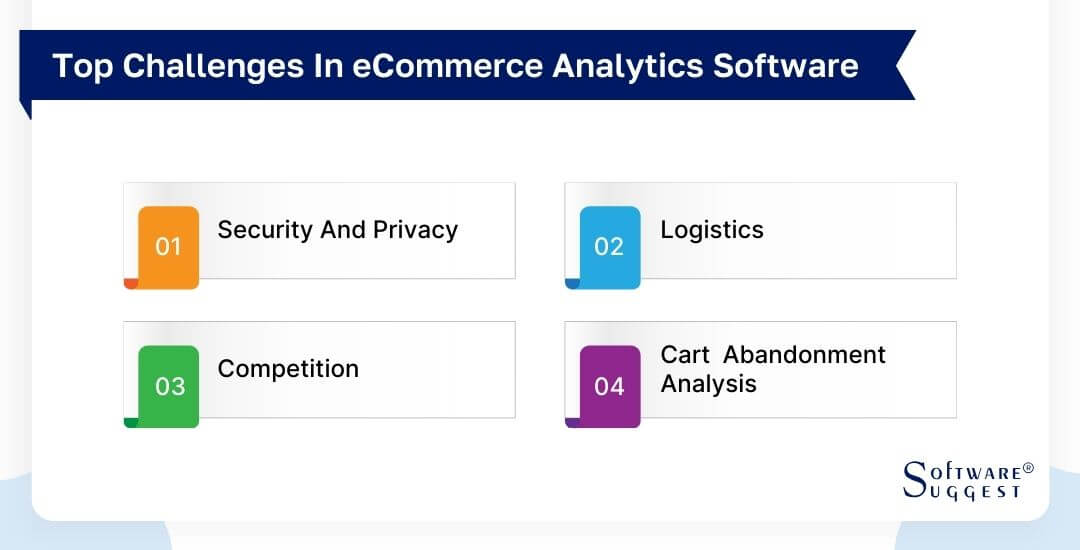
-
Security and Privacy
eCommerce companies must ensure robust security and privacy measures to protect user data. Ensuring compliance with relevant regulations and standards enhances user trust and satisfaction and prevents potential legal issues. A focus on security and privacy also ensures the integrity and accuracy of data, enhancing the reliability of insights and analysis.
-
Logistics
Addressing logistical challenges is streamlined with the best analytics tools for e-commerce. By analyzing and optimizing supply chain and delivery processes, these tools ensure timely and efficient delivery, enhancing customer satisfaction. An efficient logistics process also reduces costs and improves operational efficiency, contributing to overall business success.
-
Competition
With the proliferation of various eCommerce companies, staying ahead of the competition is a significant challenge. Choose the best analytics software for eCommerce that offers unique and advanced analytics features, ensuring a competitive edge in the market.
-
Cart Abandonment Analysis
One major hurdle in using eCommerce analytics tools is cart abandonment analysis. Accurate analysis helps in understanding the reasons behind cart abandonment, allowing businesses to implement strategies to improve customer retention and conversion rates.
Market Trends Related to eCommerce Analytics Tools
Staying abreast with the latest trends in eCommerce analytics tools is indispensable for ensuring your e-commerce platform remains competitive and relevant in the ever-evolving digital marketplace. Some key trends include:
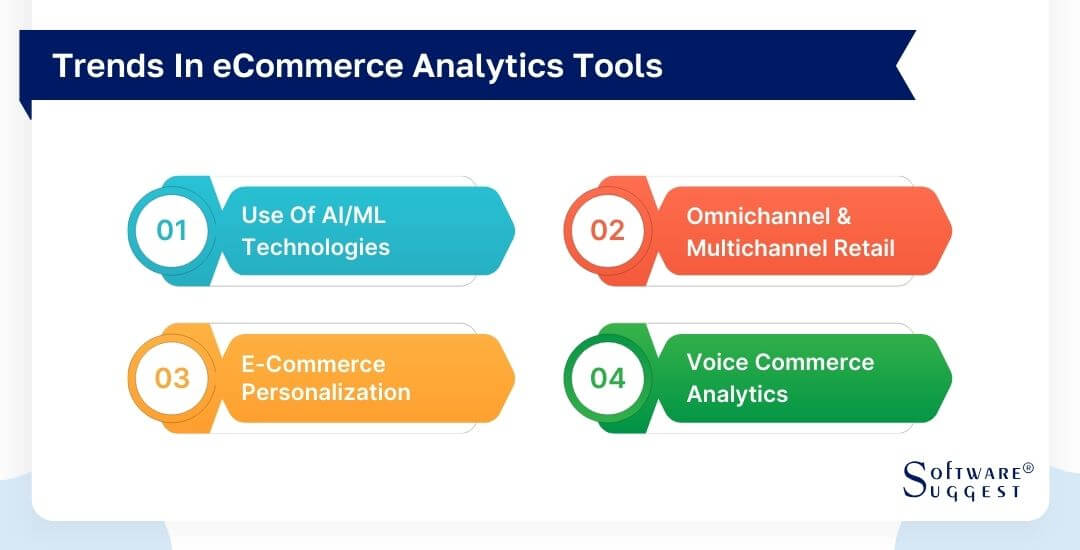
-
Use of AI/ML Technologies
The integration of AI/ML technologies in eCommerce analytics tools provides advanced data insights and analytics capabilities. These advanced technologies enable more effective and informed decision-making and strategy formulation. By leveraging AI/ML, businesses can uncover deeper insights, predict trends, and make more accurate forecasts, enhancing their strategic planning.
-
Omnichannel and Multichannel Retail
eCommerce analytics companies are focusing on offering solutions for omnichannel and multichannel retail, ensuring businesses can effectively navigate the complex multi-channel retail landscape. This focus enables businesses to provide a consistent and seamless customer experience across various marketing channels, improving customer satisfaction and loyalty. Effective management of omnichannel and multichannel retail also enhances operational efficiency and profitability.
-
E-commerce Personalization
One emerging trend in the field is e-commerce personalization, where the best analytics tools for eCommerce are leveraged to provide tailored shopping experiences. This trend enhances customer satisfaction and loyalty in online stores by delivering more relevant and personalized content and product recommendations.
-
Voice Commerce Analytics
Voice commerce analytics is another burgeoning trend. The best eCommerce analytics tools are now incorporating features to analyze voice commerce data, providing valuable insights into this growing segment of e-commerce and helping businesses optimize their strategies for voice-activated shopping experiences.
Conclusion
eCommerce analytics tools are crucial for the success and growth of e-commerce businesses in today’s competitive landscape. They offer essential insights and capabilities, allowing e-commerce businesses to make informed decisions, optimize their strategies, and enhance their performance and profitability, leading to increased customer satisfaction and business success.
FAQs
The cost of eCommerce analytics tools can vary broadly based on the features, functionality, and provider. While some basic versions are available for free, more advanced tools with extensive analytics capabilities may require a subscription or license fee. These costs can range from $80 to more than $150,000 annually, depending on your business requirements.
Some eCommerce analytics platforms operate on a tiered pricing model, offering different packages to suit various business needs and budgets. It's essential to thoroughly assess the pricing, as well as the features offered by each package, to ensure it aligns with your business requirements and budget constraints.
eCommerce analytics tools allow for extensive data tracking and analysis. You can monitor customer behavior, including their browsing patterns, purchase history, and interaction with your website. These tools also provide insights into sales data, helping you understand which products are performing well and which may need attention. Analyze the performance of marketing campaigns to identify which strategies are most effective in attracting customers and driving sales.
Furthermore, evaluate product performance, track inventory levels, and gain insights into other crucial aspects such as cart abandonment rates and customer feedback. This comprehensive data analysis facilitated by eCommerce analytics tools is instrumental in making informed business decisions and optimizing various facets of your eCommerce business.
eCommerce analytics tools are designed to integrate seamlessly with a multitude of other software solutions to enhance functionality and provide additional analytics capabilities. Most platforms can integrate with customer relationship management (CRM) systems, email marketing software, social media platforms, and other marketing automation tools.
This integration allows for the efficient and centralized management of various aspects of your eCommerce business, ensuring a smooth and cohesive operation. Integration with various software solutions also enables the pooling of data from different sources, providing more comprehensive and meaningful insights for data analysis and decision-making processes.





















.jpg)




